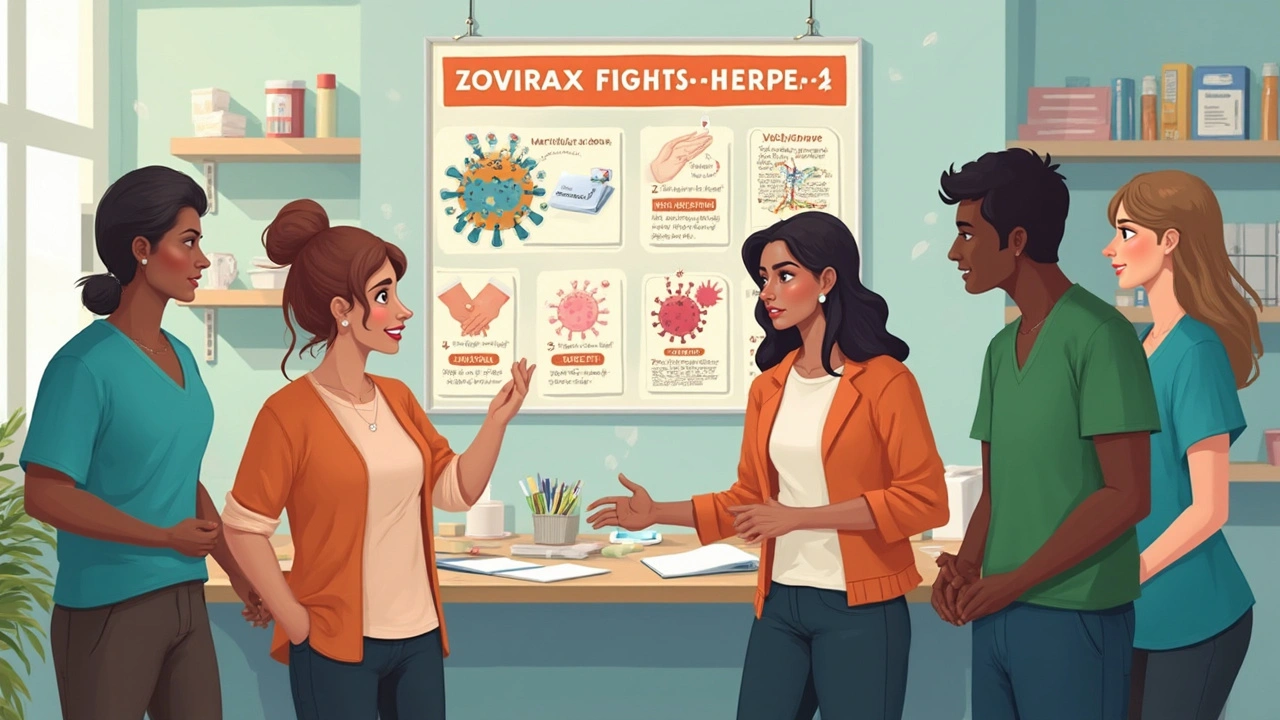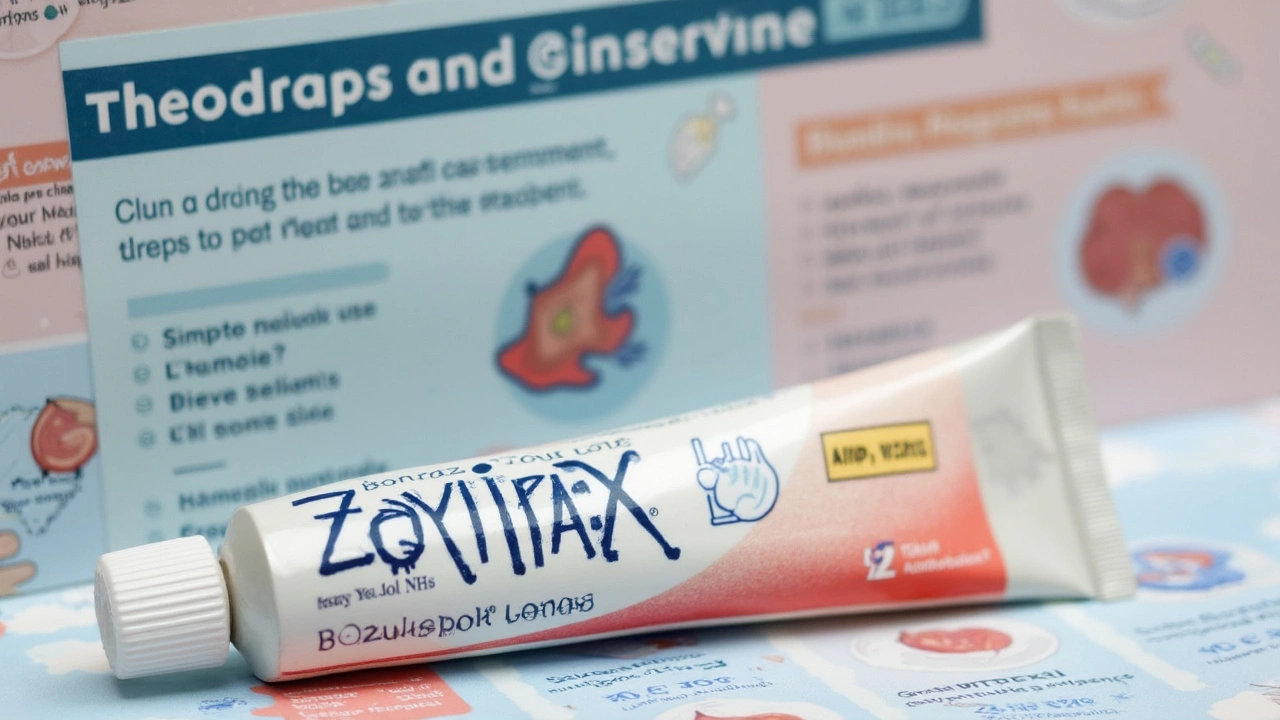Ever noticed how cold sores pop up at the worst moments—say, just before a big date or job interview? You're definitely not alone. Cold sores are sneaky, frustrating, and can turn an ordinary week upside-down. When they hit, you start hearing recommendations from just about everyone: ice cubes, tea bags, garlic, or some over-the-counter cream that promises the world. Still, nothing beats a real antiviral, and that's where Zovirax steps into the fight.
What Is Zovirax and How Does It Work?
Zovirax is actually the brand name for acyclovir. This isn't some herbal remedy or old wives' tale—it's a real-deal antiviral medication that's been around since the 1980s. In Sydney, it's as common as a pharmacy itself. Doctors here write thousands of scripts for it every week, not just for colds sores but for several gnarly viruses. Zovirax targets certain viruses, most famously the herpes simplex virus (HSV), which causes both those dreaded cold sores around your lips and the less spoken-about, but equally miserable, genital herpes. It’s also used for tackling the varicella-zoster virus—the jerk that brings you chickenpox and shingles.
Here’s how it works: acyclovir stops viruses from multiplying by blocking an enzyme that only the virus can use. It’s pretty specific; it doesn’t mess with healthy cells or bacteria, which is why you don’t use Zovirax for stuff like strep throat. The science is actually fascinating: acyclovir sneaks into virus-infected cells and gets converted by another viral enzyme into its active form. That active form then puts on the brakes, halting the virus in its tracks—but only while it’s replicating. If you start Zovirax early, you can sometimes stop a cold sore before it’s even visible, turning a full-blown crusty disaster into a tiny dot that fades fast.
The medication comes in a few different forms: oral tablets, capsules, a liquid, a cream, and even an intravenous option (used mostly in hospitals for severe infections). In Australia, the cream is a go-to for cold sores and the tablets are used for more serious outbreaks, especially in folks with lower immunity. According to data from Australia's Therapeutic Goods Administration, Zovirax has consistently ranked as one of the top five prescribed antivirals for over a decade.
Unlike antibiotics that treat bacterial infections, acyclovir’s focus is the herpes family. You can’t use it for the flu, COVID, or a runny nose. Even within herpes viruses, Zovirax has limits. For instance, it works okay for cytomegalovirus (CMV) but other drugs like valganciclovir or ganciclovir do a better job there. That said, for cold sores and shingles, Zovirax is still called a gold standard by doctors everywhere.
Now, Zovirax isn’t a cure. Let’s say that again—it doesn’t make herpes go away for good. You’re stuck with the virus, because it camps out in your nerves and comes back when you’re tired, stressed, or run down. What Zovirax does is take those outbreaks and make them shorter, milder, and less miserable.
| Infection | Typical Zovirax Form | Usual Course |
|---|---|---|
| Cold sores (oral herpes) | Cream or tablets | 5 days |
| Genital herpes | Tablets | 5–10 days (longer if recurring) |
| Shingles (zoster) | Tablets | 7 days |
| Severe herpes (hospital) | IV infusion | As decided by doctor |
Doctors will often suggest starting Zovirax as soon as you feel the first tingle or itch where a blister’s about to form. The sooner, the better. Everyone’s recovery speed varies, but one UK-based trial found that about 60% of people who started cream within two hours of the first sign prevented the sore from breaking out at all. Pretty good odds, right?

When to Use Zovirax and What to Expect
Using Zovirax isn’t rocket science, but there are little tips that make all the difference. Timing is absolutely everything. If you’re treating a cold sore, don’t wait for the crater—start at the very first sign, even if it’s only a weird tingle or tiny bump. The cream should be dabbed, not rubbed, to avoid spreading the virus. With tablets, set a reminder on your phone; this stuff only works if you stick to the schedule, usually five times daily for a standard outbreak.
There’s no magic shortcut. Skipping doses gives the virus room to double down and that wipes out the benefits. Alexandra, my wife, learned this the hard way during her first year teaching in Sydney. She’d been battling cold sores since high school, and on her busiest teaching weeks—when she’d sometimes forget her doses—the sores would stick around for ages. Once she started being strict with her Zovirax routine, the healing time dropped by half. You’d be amazed how quickly those blisters shrink when you’re on top of your antiviral game.
The tablet and liquid forms are also used for chickenpox and shingles. Adults with shingles actually need this more than kids with chickenpox. Shingles can land you in serious agony if not caught early, especially for people over 50. The Australian Medical Association recommends Zovirax within 72 hours of those nerve pain and rash, showing up on your skin. Miss that window and you risk long-lasting pain (called postherpetic neuralgia) even after the rash clears. No one wants to deal with that nightmare, trust me.
For kids, Zovirax gets muddy. Not all children need this for chickenpox, unless they have weaker immune systems or other medical issues. Otherwise, healthy kids usually handle chickenpox on their own. Always—and I mean always—ask a doctor before giving Zovirax to little ones.
Tossing another useful stat your way: a study from the “Journal of Antimicrobial Chemotherapy” found that people who used Zovirax cream within six hours of a cold sore’s start saw healing times cut by almost two days compared to placebo. I’ve kept tubes of the cream stashed everywhere—bathroom, backpack, glovebox—just in case.
Prophylactic (preventive) use is another story. Folks who get crazy-frequent outbreaks—say, monthly or after every stressful week—may take a lower dose of Zovirax daily for months or more. This is called suppressive therapy, and it’s a life-changer for people whose social life or jobs get wrecked by herpes flares. Your doctor will decide if you’re someone who needs it that often, but it’s an option many don’t realize is out there.
The catch is that Zovirax doesn’t work well unless the virus is actively replicating, meaning it’s basically useless if you catch the sore too late (after scabbing) or try it on a bug that’s not herpes-related. So next time you get what looks like a cold sore, move fast, but don’t use it randomly for things it doesn’t help. If you’re unsure, snag a doc appointment—they can swab your sore to confirm HSV before you waste money on the wrong cream.
For those taking other medications or managing kidney issues, check with your doctor first. Zovirax is processed mostly through the kidneys and may need dose tweaks in folks whose kidneys aren’t firing at 100 percent. The same goes for pregnant women—while Zovirax is considered reasonably safe (it’s been studied in thousands of pregnant women), only your doctor can say if you should use it or wait.

Side Effects, Myths, and Tips for Safe Use
Every medicine has its share of urban legends, and Zovirax is no exception. You’ve probably heard everything from “it’ll dry your lips out” to something more dramatic like “it fries your liver.” Most people, though, don’t have any big problems using Zovirax. The cream can sometimes sting a bit where it’s applied, especially if the sore has already popped, but the feeling fades pretty quickly. Tablets are well-tolerated for most folks, with the most common issues being mild nausea or headaches. About 1 in 20 people mention tummy complaints or dizziness, according to data collected by New South Wales Health.
Rarely, you might see an itchy rash, swelling, or fever—if that happens, stop and grab a medical appointment, because you could be allergic. The one thing to really watch for is using lots of Zovirax long-term, or if you have serious kidney disease. The kidneys do all the heavy lifting clearing Zovirax out, and if they’re struggling, you could end up with more side effects like confusion or tremors. Fortunately, this is uncommon and your doc will test your kidneys if you’re on long-term therapy.
Then there’s drug resistance. Here’s the honest scoop: resistance to Zovirax in otherwise healthy people is rare, even after years of on-and-off use for cold sores or genital herpes. It pops up more in people with weakened immunity, like those receiving chemotherapy or organ transplants. For everyone else, Zovirax remains reliable, especially when it’s used correctly. Don’t share your tube of Zovirax cream with anyone else, though—cross-infection is a real thing and can make resistance more likely.
Let’s clear up a few myths:
- Zovirax does NOT cure herpes. It manages it.
- You CAN use makeup over Zovirax cream, but let it dry fully first.
- Don’t use Zovirax cream inside your mouth or eyes—it stings like mad and doesn’t work there.
- The cream won’t stop you from spreading herpes to others, but it might make active blisters less likely to shed virus.
- It’s not a one-size-fits-all for all skin blisters—herpes only.
For those living with someone prone to outbreaks, like in my house with Alexandra, hygiene is everything. She’s made a habit of washing hands before and after cream applications, never sharing towels during an outbreak, and always letting her partner know if she feels that first tingle. We also toss toothbrushes after every outbreak, since viral particles can hang around. Little habits, but they really keep transmission low.
If you want to dodge the next outbreak, look into your triggers. For some, it’s sunlight (yep, Sydney summers can be brutal), illness, or major life stress. Using a daily sunblock on lips or packing in enough sleep has saved friends from countless cold sores. And don’t skip the healthy stuff—exercise, good diet, stress-busting are legit outbreak fighters, even if your main weapon is an antiviral.
If you hit a sore you just can't shake, or you keep getting outbreaks despite doing everything by the book, see your doctor. You might need a longer suppressive course or a higher dose for a while. And if you see sores somewhere unusual, such as around the eyes, head to a doctor quickly—eye herpes can cause lasting problems if not treated fast.
So, is Zovirax worth keeping on hand? Absolutely, if you’re someone who gets herpes outbreaks or has close contact with folks who do. Keep it close by, use it smart, and don’t fall for shortcuts that sound too good to be true. If in doubt, there’s always your pharmacist or GP for backup. At the end of the day, herpes is sneaky, but with the right tools and quick action, it doesn’t have to run your life.

